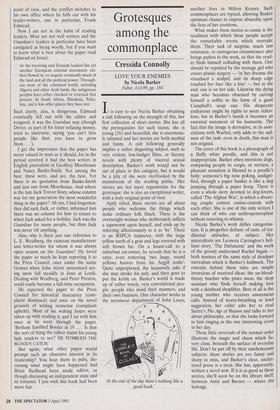Grotesques among the commonplace
Cressida Connolly
LOVE YOUR ENEMIES by Nicola Barker Faber, £14.99, pp. 184 It is easy to see Nicola Barker obtaining a cult following on the strength of this, her first collection of short stories. She has all the prerequisites for such status: she is young (26) and beautiful; she is enormous- ly talented and her stories are both morbid and funny. A cult following generally implies a rather disgusting subject, such as very violent, low-budget films, or literary novels with plenty of visceral sexual description. Barker's work would not be out of place in this category, but it would be a pity of she were overlooked by the mainstream of the reading public. Her stories are not mere repositories for the grotesque; she is also an exceptional writer, with a truly original point of view.
Aptly titled, these stories are all about people who welcome the things which make ordinary folk flinch. There is the overweight woman who deliberately inflicts a tapeworm upon herself, and ends up by referring affectionately to it as 'he'. There is an RSPCA inspector, with the large yellow teeth of a goat and legs covered with soft brown fur. On a house-call to a suburban cat-owner, he reveals that he is a satyr, even removing 'two large, round yellowy hooves from his Argyll socks'. Quite unperplexed, the housewife asks if she may stroke his pelt, and then goes to put the kettle on. Barker's world is made up of rather lonely, very conventional peo- ple: people who mind their manners, and their own business. One character works in the menswear department of John Lewis; At the end of the day there's nothing like a good book' another lives in Milton Keynes. Such commonplaces are typical, allowing Barker optimum chance to impose absurdity upon the lives of her creations.
What makes these stories so comic is the readiness with which these people accept the remarkable events which overtake them. Their lack of surprise, much less resistance, to outrageous circumstance also brings pathos to the work, so that the read- er finds himself colluding with them. One should be repulsed by the teenage girl who craves plastic surgery — 'in her dreams she visualised a scalpel, and its sharp edge touched her face like a kiss' — but in the end, one is on her side. Likewise the dying man who becomes obsessed by carving himself a coffin in the form of a giant Campbell's soup can. His desperate endeavour ought by rights to seem ridicu- lous, but in Barker's hands it becomes an essential statement of his humanity. The fact that the image is derivative, in its asso- ciations with Warhol, only adds to the sad- ness of the task: even in death, this man is not original.
The cover of this book is a photograph of a fluffy white poodle, and this is not inappropriate. Barker often mentions dogs, comparing people to corgis, or terriers; a pleasant sensation is likened to a poodle's belly; someone's big nose poking, undigni- fied, through a paper hankie is like a dog jumping through a paper hoop. There is even a whole story devoted to dog-lovers, called 'The Afghan War', in which a divorc- ing couple contest canine-custody with each other. She is one of the only writers I can think of who can anthropomorphise without resorting to whimsy.
Nicola Barker's work defies categorisa- tion. It is altogether defiant: of taste, of tra- ditional attitudes, of subject. Her antecedents are Leonora Carrington's bril- liant story, 'The Debutante' and the work of the grossly underrated Rachel Ingals both masters of the same style of deadpan surrealism which is Barker's hallmark. The conceits behind these tales are simple inversions of received ideas: the un-blood- thirsty butcher who pities meat; the shop assistant who finds herself making love with a skinhead shoplifter. Best of all is the young mother who receives anonymous calls. Instead of heavy-breathing or lewd suggestion, her caller asks her to read Sartre's The Age of Reason and talks to her about philosophy, so that she looks forward to him ringing as the one interesting event in her day.
These little reversals of the normal order illustrate the magic and chaos which lie, very close, beneath the surface of everyday life. Don't be put off by their unwholesome subjects: these stories are too funny and sharp to miss, and Barker's clear, unclut- tered prose is a treat. She has, apparently, written a novel now. If it is as good as these stories, she'll soon be on the library shelf, between Amis and Barnes — where she belongs.


















































 Previous page
Previous page